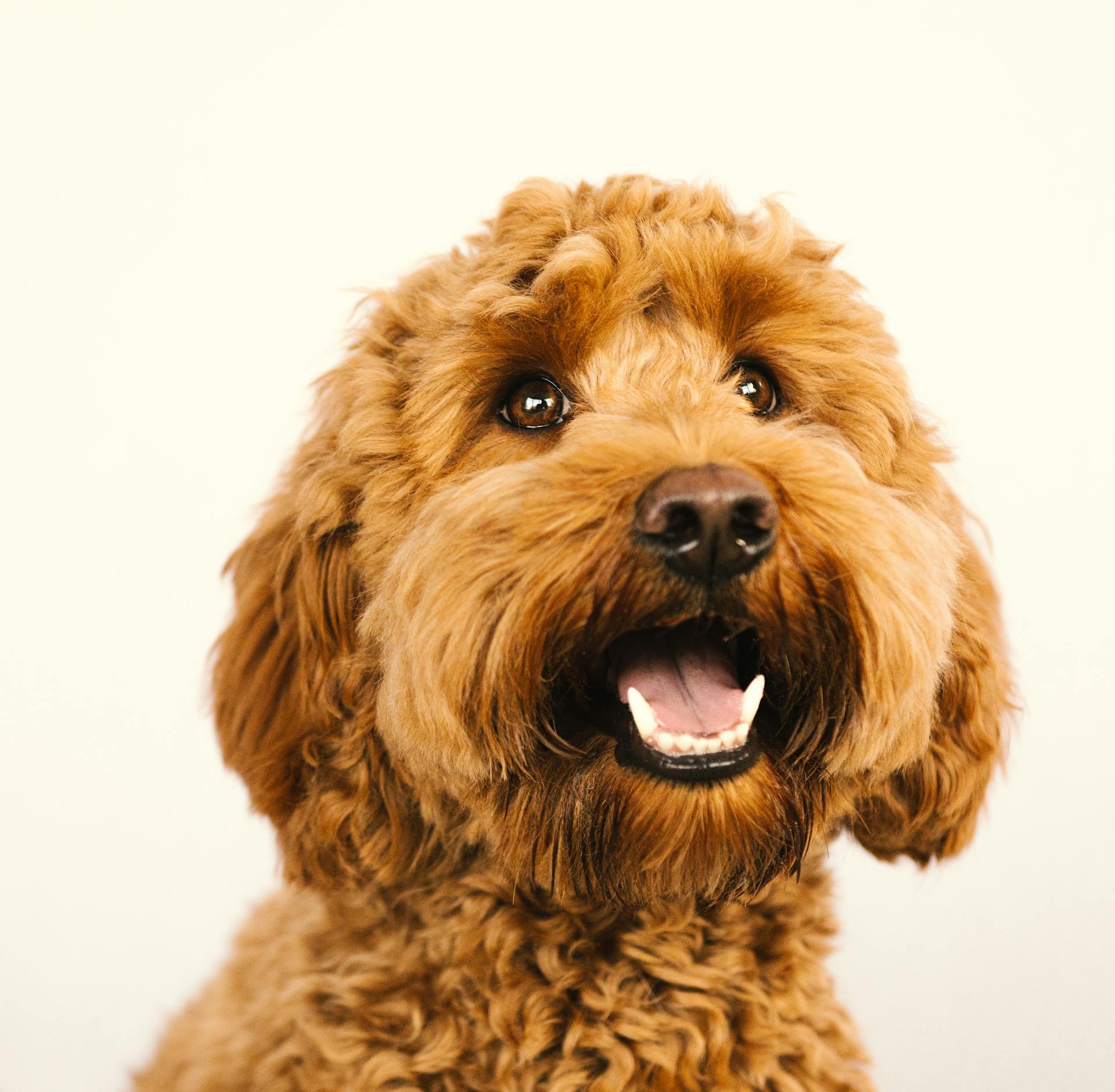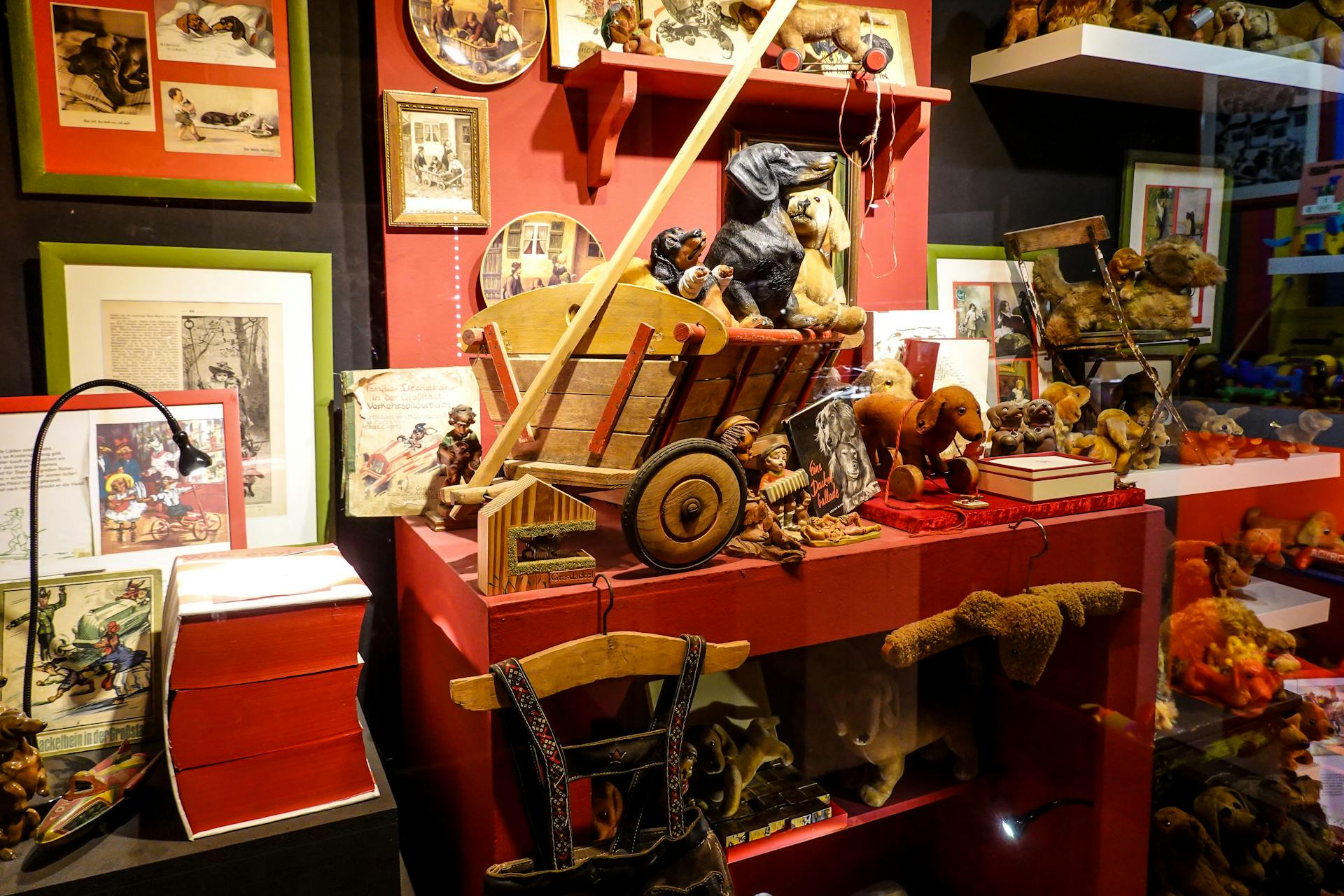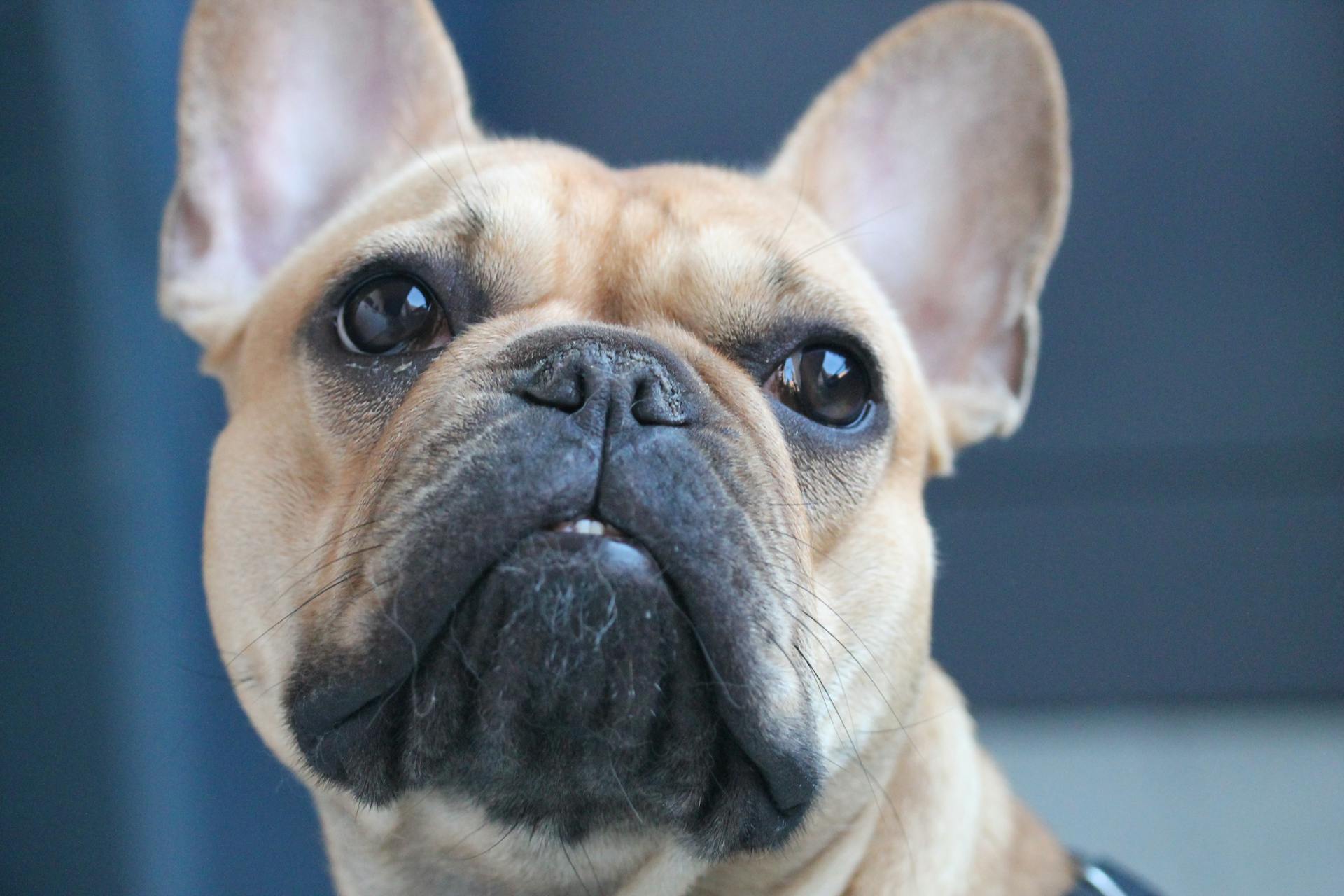
Mini Goldendoodles are a popular breed, and for good reason. They're often described as a perfect blend of their Golden Retriever and Poodle parents, inheriting the best traits from both.
Their small size, typically weighing between 15-30 pounds, makes them an ideal choice for families living in apartments or with small yards. Mini Goldendoodles are also highly intelligent, which means they're relatively easy to train.
One of the most significant advantages of Mini Goldendoodles is their low-shedding coat, which requires regular grooming but produces less dander than their full-sized counterparts. This makes them a great option for people with allergies or who prefer a low-maintenance coat.
What Is the History of Mini Goldendoodles
The mini goldendoodle has a rich history that dates back to the mid-1990s. It was bred to combine the intelligence of the poodle with the gentle disposition of the golden retriever.
Poodles originated in Germany, where they were used for hunting and retrieval. They were later refined into three additional sizes - standard, miniature, and toy - by the French.
The golden retriever, on the other hand, was bred in Scotland in the 19th century to be a loyal and attentive companion. Lord Tweedmouth wanted a dog that could retrieve waterfowl without damaging the bird.
In 1932, the golden retriever was recognized by the American Kennel Club and quickly became one of the most popular purebreds. They're known for being great family pets, devoted to their owners, and loving children.
The poodle's history is also marked by its association with high society, where they were refined into smaller sizes for companionship. The French population was particularly fond of the poodle, and it's their influence that gave us the iconic poodle haircut.
The mini goldendoodle's heritage is a testament to the intelligence and trainability of both breeds. With their gentle nature and easy trainability, it's no wonder they've become a popular choice for families and first-time dog owners.
For your interest: Labradoodle vs Standard Poodle
Physical Characteristics
As you consider bringing a mini goldendoodle into your family, it's essential to understand their physical characteristics. Mini goldendoodles are a ball of fluff as puppies, with a teddy-bear appearance that's hard to resist.
They come in a range of colors, including golden, red, and dark brown. Their size can vary depending on which breed characteristics they take on, but they're generally well-proportioned with large, expressive eyes.
Mini goldendoodles have a unique gait due to the leg characteristics they inherit from the poodle, which gives them a "prance-like" movement. They also have floppy ears and a long, fluffy, or feathered tail, similar to the golden retriever.
Their coat type changes as they age, maturing from fluffy to wavy, flat, or curly fur. If they take on more characteristics of the golden retriever, their fur can even be straight.
In terms of size, mini goldendoodles typically weigh between 15 to 35 pounds and reach a height of between 13 to 30 inches, depending on their parents' height and weight.
Readers also liked: Mini Goldendoodles Size
Appearance
Mini goldendoodles are a ball of fluff as puppies, with a teddy-bear appearance that's hard to resist.
Their size can vary, but they're generally well-proportioned with large, expressive eyes and a rounded head.
A short to medium-sized muzzle and floppy ears are also common features of mini goldendoodles.
Their legs give them a "prance-like" gait, a trait inherited from the poodle breed.
As they mature, their coat can change from fluffy to wavy, flat, or curly, and in some cases, even straight.
Their tail is long, fluffy, or feathered, much like the golden retriever breed.
Discover more: Pros and Cons of Boxer Dogs
Size
Mini Goldendoodles are a great choice for many families, and one of the reasons is their compact size. They typically weigh between 15 to 35 pounds.
Their height can vary, but generally, they range from 13 to 30 inches. This smaller stature makes them a great fit for city apartments or country homes, as they require less space.
One of the benefits of their smaller size is that they eat less food than their parent breeds. This can be a significant cost savings for dog owners.
Mini Goldendoodles are also incredibly versatile, able to adapt to almost any living situation. They can travel easily, using little room and supplying a gung-ho attitude and bright personality.
Here's an interesting read: Full Grown Cockapoo Size Comparison Chart
Temperament and Personality
Mini Goldendoodles are known for their friendly and playful nature, making them an ideal family pet. They love to show affection and are eager to please, which means they thrive on attention and interaction.
These dogs are highly social and inherit a happy-go-lucky attitude from their Golden Retriever parent, making them unsuitable for introverts. They can turn a simple evening walk into a "meet and greet" session with everyone you come across.
Mini Goldendoodles are incredibly intelligent and take on the trait of being easy to train, thanks to their Poodle and Golden Retriever heritage. They respond well to calm, positive instructions and praise, making them a joy to train.
Their sensitive nature means they can develop separation anxiety if left alone for too long, so they'll often want to join you on outings. They're also prone to barking, which can be loud and frequent, especially when they're bored or excited.
These dogs are not aggressive and get along well with kids and other animals, but they do require socialization and obedience training to prevent behavioral issues. With proper training and care, Mini Goldendoodles can be wonderful companions.
You might like: Pros and Cons of Shock Collars
Fantastic Personality

Double Doodles, also known as Mini Goldendoodles, have exceptional characters that make them a perfect companion for dog lovers. They love to show affection and are devoted to their owners.
Their laid-back disposition makes them a great match for families with kids, as they are patient and gentle. However, be prepared for a dog that will monopolize the conversation, as they are highly sociable.
Mini Goldendoodles are known for their gentle and mild-tempered natures, making them a great choice for families with small children. They are also eager to please and love to learn new things.
Their playful nature is contagious, and they will keep you entertained for hours with their antics. But don't be surprised if they get a little too excited and jump all over you - it's just their way of showing affection.
These dogs are intelligent and easy to train, thanks to their Poodle and Golden Retriever heritage. They are also incredibly social and love to meet new people, which can be both a blessing and a curse.
While they may not be the best choice for introverts, Mini Goldendoodles make great family pets for those who are looking for a loyal and loving companion. Just be prepared for a dog that will follow you everywhere and demand attention at all times.
Overall, Double Doodles have a fantastic personality that makes them a joy to be around. With their gentle nature, playful antics, and loving disposition, it's no wonder they're a popular choice for dog owners everywhere.
The 5
The Big Five personality traits are a fundamental aspect of temperament and personality. These traits are a combination of neuroticism, extraversion, openness to experience, agreeableness, and conscientiousness.
Neuroticism is the tendency to experience negative emotions, such as anxiety and anger. People high in neuroticism are more likely to get upset in stressful situations.
Extraversion is the tendency to seek out social interaction and stimulation. Extraverted people tend to be outgoing and enjoy being around others.
Openness to experience is the tendency to be open-minded and curious. People high in openness tend to be more creative and appreciate art and ideas.
Agreeableness is the tendency to be cooperative and compassionate. Agreeable people tend to be kind and considerate of others.
Conscientiousness is the tendency to be organized and responsible. Conscientious people tend to be reliable and dependable.
Intelligence and Trainability
Mini goldendoodles are highly intelligent and eager to please, making them relatively easy to train. They thrive on pleasing their owners and love to learn, but their playful energy can create short attention spans, so keep training sessions short.
A combination of positive reinforcement and reward-based training will go a long way with mini goldendoodles. They're naturally good at learning and responding to treats, toys, and other rewards. They're also sensitive to tone of voice, so calm, positive instructions will get the most out of them.
With early socialization and training, mini goldendoodles can develop outstanding focus and become brilliant dogs that thrive on cerebral stimulation. They need plenty of enrichment toys to play with and can get into mischief if their minds aren't stimulated.
A different take: Why Are Goldendoodles so Expensive
Intelligence and Trainability
Mini Goldendoodles are intelligent and eager to please, making them relatively easy to train. They thrive on pleasing their owners and love to learn.
A combination of positive reinforcement and reward-based training is key to successful training. Avoid using punishment and focus on working with their smarts and eagerness to please using treats, toys, and other rewards.
Mini Goldendoodles are naturally gregarious and get along well with others, but they do require good socialization from an early age.
These dogs are bright, thoughtful, and brilliant, and they need a lot of cerebral stimulation to thrive. Providing them with plenty of enrichment toys and training can help keep their minds active and engaged.
Mini Goldendoodles are people-pleasers and gentle, but they can be loud and vocal, barking when happy, excited, or bored. They may require some training to reduce impulsive barking.
Their intelligence and outgoing demeanor make them ideal family pets, but they can develop separation anxiety if left alone for too long. They'll thrive on attention and interaction, so be prepared to spend quality time with your Mini Goldendoodle.
These dogs are sensitive to tone of voice, so calm, positive instructions will get the most out of them. Lots of praise and tasty treats will also help reinforce good behavior.
For another approach, see: Are Mini Goldendoodles Smart
The 4
The 4 key factors that determine intelligence and trainability in animals are instinct, learning, memory, and problem-solving.
Instinct plays a significant role in intelligence and trainability, as it allows animals to perform complex tasks without prior learning or experience. For example, a border collie's instinct to herd sheep is evident in its ability to gather and manage the sheep without any prior training.
Learning is another essential factor, as it enables animals to acquire new skills and knowledge through experience and practice. In one study, a group of dogs learned to perform a complex task in just a few trials, demonstrating their ability to learn quickly and efficiently.
Memory is also crucial for intelligence and trainability, as it allows animals to recall and apply previously learned information. Research has shown that some animals, such as elephants, have exceptional memory and can recall events from years ago.
Problem-solving is the fourth key factor, as it enables animals to adapt to new situations and find creative solutions to challenges. In a famous experiment, a group of primates was able to solve a complex problem by using tools and working together, showcasing their advanced problem-solving abilities.
Health and Grooming
Mini Goldendoodles are generally a healthy breed, but like any other breed, they can inherit genetic conditions from their parents. They are less likely to inherit diseases due to their hybrid nature, but it's still essential to be aware of potential health issues.
Their lifespan is estimated to be between 12 to 15 years, making them a long-lived breed. With proper care and attention, they can live a relatively healthy life.
Some common health issues in Mini Goldendoodles include hip dysplasia, von Willebrand's disease, and cancer. These conditions can be serious and may require medical attention.
Here is a list of potential health issues in Mini Goldendoodles:
- Hip Dysplasia
- Von Willebrand's Disease
- Cancer
- Bloat
- Dental issues
- Allergies
- Ear and eye infections
Regular grooming is also essential for Mini Goldendoodles. They require regular brushing to prevent matting and tangling of their coat, and they should be bathed every 6 to 8 weeks. Nail trimming, ear checking, and dental care are also crucial parts of their grooming routine.
Discover more: Groomed Goldendoodles
Health and Grooming
Double Doodles require a fair amount of attention to keep their coats looking good.
Brushing will be necessary twice per week, depending on their hair type, as these dogs don't shed much but can mat and tangle quickly, especially if they have more Poodle-like coats.
Baths should be taken every six to eight weeks, and haircuts every three months are recommended.
Mini goldendoodles only shed lightly, but they do need some grooming to keep their coat healthy.
As an adult, mini goldendoodles should be brushed about once a week, but this also depends on how often you get their hair trimmed.
You should also trim their nails once or twice per month unless your dog is active and wearing them down naturally.
Regular ear checks are a must for mini goldendoodles with floppy ears, as they can be prone to infections if not properly cared for.
Keeping your mini goldendoodle's teeth clean is also important, with brushing needed at least two or three times a week.
A unique perspective: Do Mini Goldendoodles Shed
Do Shed?
Mini goldendoodles are low shedders, and in some cases, they don’t shed at all. Poodle breeds hardly shed, but golden retrievers do, so the shed level of your mini goldendoodle will depend on which genetic traits they take on.
Generally, your mini goldendoodle will be a low to non-shedder.
See what others are reading: Do Mini Golden Doodles Shed
Health and Lifespan
Mini Goldendoodles are generally a healthy breed, but like all breeds, they can inherit genetic conditions from their Poodle and Golden Retriever parents. Regular check-ups at the vet and preventative care can help prevent or manage these conditions.
Hip dysplasia is a common issue in Mini Goldendoodles, where the femur doesn't align well with the pelvic socket of the hip joint, causing pain or lameness. This can be prevented with joint supplements like glucosamine and omega-3 oils.
Patellar luxation is another condition that can affect Mini Goldendoodles, where the kneecap slips out of place, causing pain when walking. Maintaining a healthy weight and feeding high-quality food can prevent this.
Mini Goldendoodles are also prone to Progressive Retinal Atrophy (PRA), a gradual deterioration of the retina in the eye that can cause night blindness and loss of daytime vision. Regular vet visits can help detect this condition early on.
Here are some common health issues that can affect Mini Goldendoodles:
With proper care and attention, Mini Goldendoodles can live a long and healthy life, with an estimated lifespan of 12-15 years. Regular exercise, a high-quality diet, and regular vet visits can help prevent or manage health issues.
Frequently Asked Questions
What are the downsides of Goldendoodles?
Goldendoodles come with some challenges, including potential health issues like hip dysplasia and allergies, as well as high costs and specific care requirements
Do mini Goldendoodles have problems?
Mini Goldendoodles can be prone to health issues like hip dysplasia and eye conditions, but responsible breeding can minimize these risks. Learn more about how to identify and prevent common health problems in mini Goldendoodles.
Sources
- https://dogacademy.org/breeds/mini-goldendoodle
- https://wagwalking.com/breed/miniature-goldendoodle
- https://www.dogsavvylosangeles.com/blog/2022/12/8/pros-and-cons-of-a-double-doodle-dog
- https://www.dogster.com/dog-breeds/miniature-goldendoodle
- https://www.dogster.com/dog-breeds/mini-goldendoodle-pros-cons
Featured Images: pexels.com


